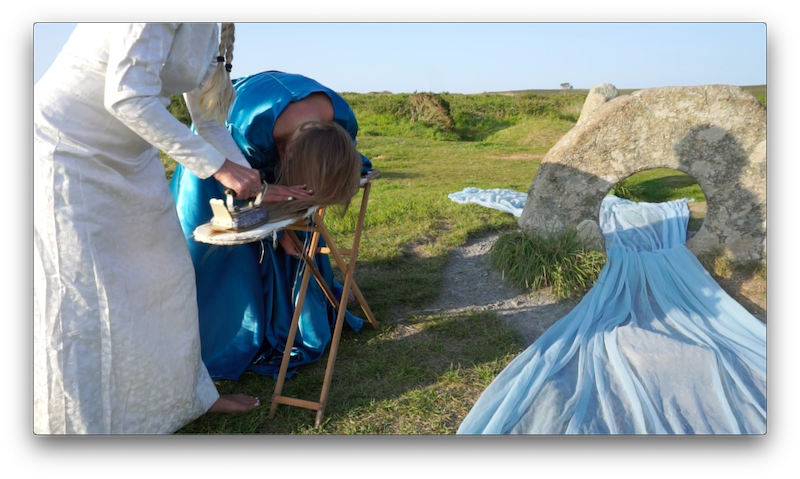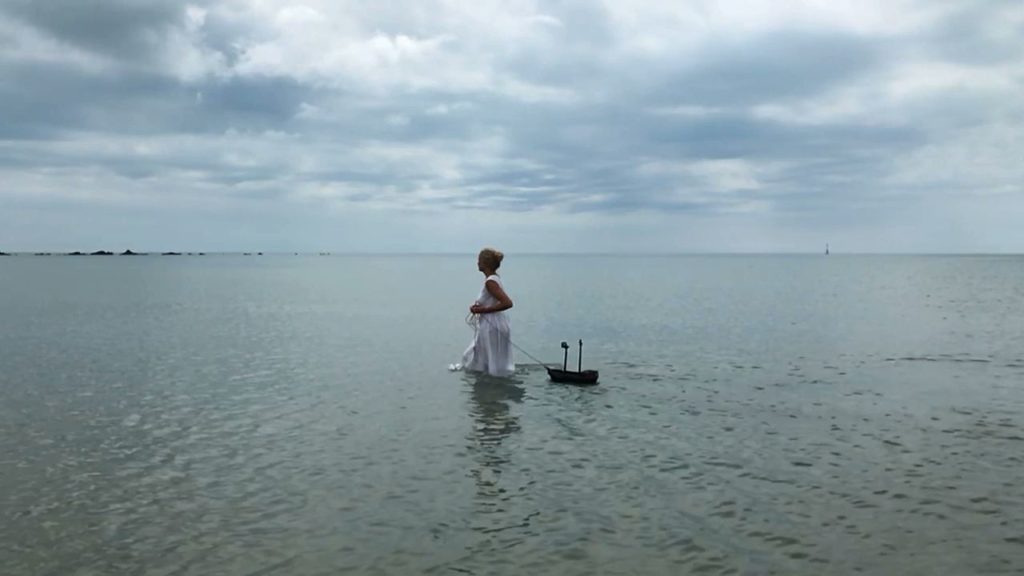
Films are central to representing women and telling their stories
‘I am passionately interested in surreal juxtapositions between the performed female body, domestic objects and landscape and in re-articulating and promoting alternative visions in which nature offers a feminist space of possibility because it is outside of domestic values and enclosures. ‘Playing’ in specific landscapes, women’s bodies are parodic and subversive, they confront, destabilise and transfigure stereotypical associations of women, and nature. Performance collaborations aim to transcend domestic ‘bounds’ and utilise the magic of encounter and the material symbolism of landscape’.
Delpha Hudson, 2023
Recent films echo themes from the performance and publishing project Theatre of the Self. They often explore the stories we tell ourselves about ourselves, suggesting that we can re-write our stories and move differently across the ‘page’ of experience to improve our mental well-being.
Many performance films start with an idiom, a domestic object and are ‘acted upon’ in a local landscape to create a personal as political story about women, value and mental health. They suggest that we can all be ‘makers of self ‘ through narrative re-structuring.
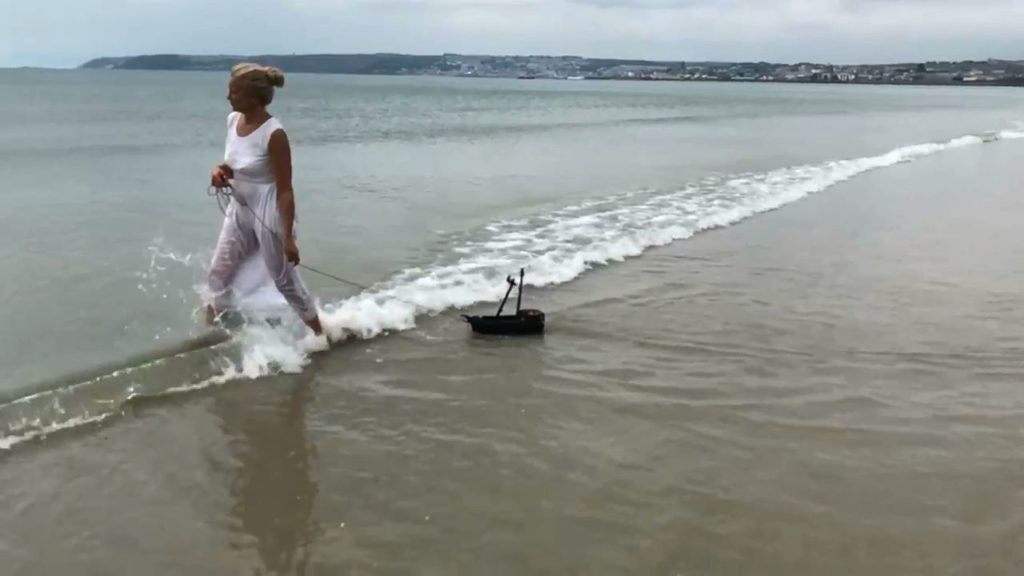
Like a Ship Righting Itself (3.39 mins) film performance, Mounts Bay, 2020.
The phrase ‘Like a ship righting itself’ is used as a metaphor for mental health and in this short film written and made in Mount’s Bay, Cornwall Delpha explores a story about motherhood and loss. Using a basic narrative structure the spoken story follows simple imagery. Filmed on an iphone by Delpha’s husband Nigel Bispham who also composed and performed the haunting piano music ‘Pythagorian Theory’ that ends the film.
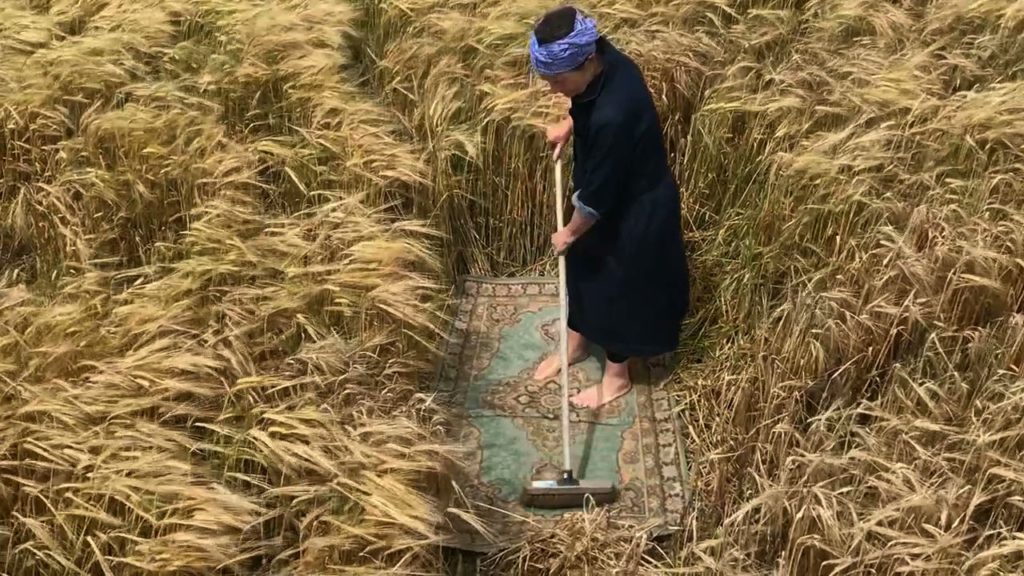
Swept Under the Carpet, (3.5 mins) is a collaborative art film made with Dr Marianne May in St Buryan, 2021.
Filmed in a barley field near St Buryan, May performs the impossible domestic task of sweeping a rug. whilst telling a personal story about effects of trauma caused by unshared secrets in families that affect women’s lives. The simple narrative structure of the film explores the stories we tell ourselves about ourselves and how sharing can help us recover from past traumas.
Juxtaposing interior and landscapes, domestic tropes and nature, films aim to explore women’s lived experience and mental health. These simply made films based around performance and personal stories are linked to previous films made over the last 20 years that have been shown all around the UK and Europe.
Read more about archive performance films 1998-2017
Ironing the Sky, performance film, Men-an-Tol, 2023
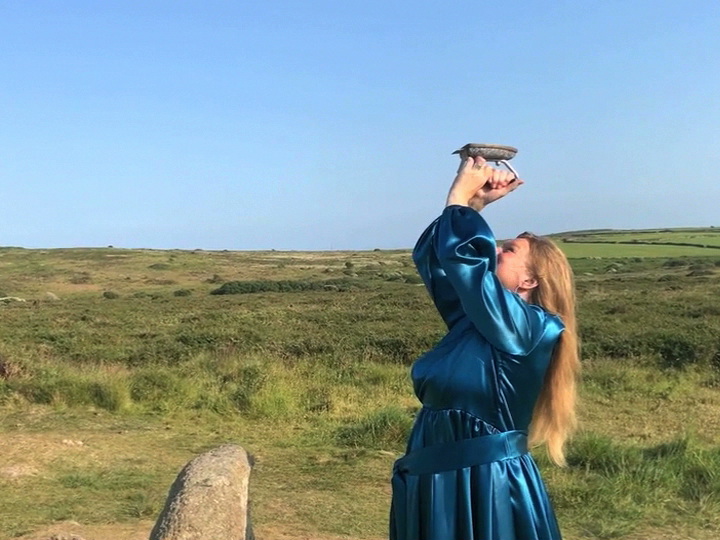
Ironing the sky (3 minutes) performance film, Men-an-tol, Cornwall, 2023. Made in collaboration with Helen Sargeant.
As with all fairy tales there is a darker truth, this dark moral tale is about a woman who is told to see the world as flat, and that she is flat and must remain forever so. She must perpetually ironing the world, her body and the sky. The story uses evident metaphors for devious patriarchal psychologies that control women, ’ flatten’ them and efface their bodies and selfhood. The story contrasts with the landscape in the film in which everything is ‘in the round’; the camera moves round in circles, the lush Cornish countryside and famous Men-an-Tol stones are round and the female body has depth, and shadow.
It’s also a personal story, maybe one that is very familiar to girls who grow up being told lies about who they are and what they must do to be happy. Girls are especially vulnerable to cultural judgements about their bodies and how to control them. They are often taught how they should see and encounter the world, not from their own experience of it. They absorb words that control their senses and block out the contradictions between what they see and understand and what they are told. They are ‘flattened’, unable to voice their own desires, their own dimensionality.
The metaphor of ironing is an ironic way of thinking about women’s stories, especially as ironing is a rarer domestic activity nowadays. As it so often falls to women to perform the impossible tasks of fulltime work, housework and family, women are so often flattened in a different way. The film aims to reveal devious ideologies in which women are confined, contained. and under-valued. Although there is no happy ending, the very fact of the film being made outside of the home in open spaces near the Men-an-tol stones in Penwith might give a sense of the possibilities of freedom and escape.
Performing and writing domestic bodies in nature; narrative and Guattari’s 3 ecologies
History has mapped nature as a political space with visible boundaries. Escaping beyond the Romanticism that has shaped our preconceptions of nature and wildness, and the appropriation of landscape and nature part of social-political ordering as a socially construct or ‘scape’ (Foucault). The nature of landscape is that certain activities are excluded from particular spaces. Demolishing monstrous domestic enclosures and renewing our relationship with open outside spaces (even if it is over-determined, and historically ‘scaped), and exploring how to transcend the ‘bounds.’ Opening out space is part of a project to,
‘take up and transform the discourses that hold sway, to rearticulate rather than run from whatever has cultural potency..[and] develop and promote alternative visions’ Stacey Alaimo
In the politics of location, space, and place women have been victims of socio-spatial boundaries that confine them through care and domestic labour. Confinement is a recurring image in women’s lives. ‘Space surrounds us in imagination that we are not free to move beyond’ writes Marion young, who also writes of potential bodily boundary confusions for women for whom birthing as an extreme suspension of inner and outer ‘the inside things emerges between my legs, for a short while both inside and outside me.’
Discovering in nature a feminist space of possibility that is outside of typical (and is antithetical to) domestic values and enclosures has the potential to create ‘parodic subversive confrontations’ that destabilise and transfigure women’s historical association with nature. Performative actions are not static or passive connections to nature. Women have not been authorised subjects or ‘knowers’, through movement and action, women have the potential to find different ways of being and knowing.
Objects and actions associated with home simultaneously contradict and mock the notion of ‘wildness,’ creating a geographical desire and marginalised resistance to it that is differentiated and paradoxical (the coexistence of sameness and difference; of contrasts between nature and nurture). Performing domestic objects and tasks outside in natural settings at once conflates and negates women’s connections to home and nature.
Countering persistent mythologies through the ecology of the body is a paradoxical resistance. It dis-places domestic care, placing it outside ‘home’ and in alternative material environments addresses complex relationships between our bodies and ‘space’. The potential pluralism of narratives that face out whilst facing ‘in’, creates a complex web of new narratives that transform the stratified and confined Self and creates de-territorialised Others.
Working in local landscapes and nature is ‘expressive of specific cultural meanings’, it works with natural phenomenon that stand for something else. Different forms of knowledge are explored through aesthetic and metaphoric elements that incorporate nature in oblique and symbolic ways. Using narratives to make work that aims to create connectivity and ethical engagement, paintings, performance and film involves each of the 3 ecological concerns that Guattari speaks of: social ecology, mental ecology, environmental ecology.
Find out more about collaborative performance and film projects with Helen Sargeant as Feral Mothers.
